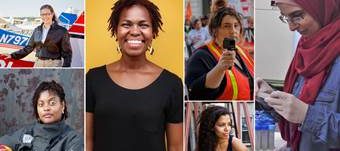Program is a joint meeting with AAUW St. Louis: March 21st, 7:00pm, via Zoom. Link via email. Request the Zoom link email.
“Afghan Refugees and their Resettlement:
From the 80’s to current times”
As we see one million Ukrainians pour over borders, we should realize that many of these folks will end up in the United States. There are lessons that we are learning with the Afghan resettlement, that we can apply and urge our governments to make life easier for the next waves of refugees.
Our speakers are Linda Lindsey from AAUW St. Louis and Susan Rodriguez of AAUW San Juan. Linda was in Pakistan while refugees were dealing with the Russians in the 80’s and is now working with a St. Louis family. Susan served with the US Army in Afghanistan and has worked with families seeking asylum in the US.
Here’s more on both our speakers:
Linda Lindsey is recently retired Senior Lecturer at Washington University in St. Louis and Emerita Professor of Sociology at Maryville University. Her teaching and research are under a gender and intersectional umbrella, including courses on diversity, inequality, globalization, and health and society. She works with the Asian Studies Development Program, a joint program of the University of Hawaii and East-West Center, assisting with institutes and field seminars in Asia for college faculty. Fulbright and other opportunities allowed work in Pakistan, Japan, India, China, Jordan, and Peru. A longtime volunteer, she works with agencies on behalf of women’s advocacy, refugees, health, and development. She is a past president of the Midwest Sociological Society and has been elected to Who’s Who in American Women and Who’s Who in America.
Susan Rodriguez deployed for a year to Afghanistan from 2012-2013 as a soldier attached to DLA (Defense Logistics Agency), working mostly at Bagram Air Force Base. She also worked about three months in the northern base in Mazar-i-Sharif, and two months in Jalalabad, near the Pakistani border, additionally making 2-3 day visits to other much smaller bases. In this work, she interfaced with local Afghans who were contracted to come on the Bases to remove unwanted scrap material .
Once she returned to the US, she was contacted by two of the contractors to help them apply to the SIV program, which is a special program though State Department for Afghans who worked for the US Government and feel threatened by the Taliban due to this arrangement. One was not able to continue the process without a letter from his employer, but the other contractor was able to complete the process after almost five years and is now living in the States with his family.
Late last summer, she assisted some of the other contractors she had worked with to apply for an expedited version of the SIV program as they were desperately trying to leave Afghanistan.
